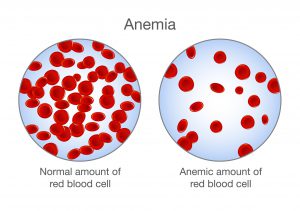 Anemia is a blood disorder that occurs when the body has low levels of healthy red blood cells or hemoglobin, which carry oxygen throughout the body.
Anemia is a blood disorder that occurs when the body has low levels of healthy red blood cells or hemoglobin, which carry oxygen throughout the body.
Anemia can be short-term or long-term and can range from mild to severe. There are many forms of anemia and each has its cause. The forms of anemia are:
- Aplastic anemia- is a rare, life-threatening condition where the body doesn’t make enough new blood cells
- Iron deficiency anemia- is the most common type of anemia, where there isn’t enough iron in the body
- Sickle cell anemia- is a serious inherited condition where the hemoglobin forces red blood cells into a crescent shape
- Thalassemia- is an inherited blood disorder that causes the body to have less hemoglobin than normal
- Vitamin deficiency anemia- there isn’t enough folate and vitamin B-12 to make enough red blood cells
Anemia symptoms depend on the cause and severity. It can be mild enough that there are no symptoms at first. However, symptoms can get worse as the anemia gets worse. Possible symptoms of anemia can include:
- Tiredness
- Weakness
- Shortness of breath
- Pale or yellowish skin
- Irregular heartbeat
- Dizziness or lightheadedness
- Chest pain
- Cold hands and feet
- Headaches
Anemia can happen if:
- The body doesn’t make enough hemoglobin or red blood cells
- Bleeding causes loss of red blood cells and hemoglobin faster than they can be replaced
- The body destroys red blood cells and the hemoglobin that is in them
Many factors can increase the risk of anemia, including:
- A diet that doesn’t have enough of certain vitamins and minerals
- Problems with the small intestines
- Menstrual periods
- Pregnancy
- Chronic conditions
- Family history
Other factors like a history of certain infections, blood diseases, and autoimmune conditions, drinking too much alcohol, being around toxic chemicals, and taking some medicines can affect the making of red blood cells and also increase the risk of anemia.
If anemia is not treated, it can cause many health problems, including:
- Severe tiredness
- Pregnancy complications
- Heart problems
- Death
Many types of anemia can’t be prevented. However, eating a healthy diet might prevent iron and vitamin deficiency anemias. A healthy diet includes:
- Iron
- Folate
- Vitamin B-12
- Vitamin C
To diagnose anemia, your healthcare provider will ask you about your medical and family history, do a physical exam, and order blood tests. Tests might include:
- Complete blood count
- A test to show the size and shape of the red blood cells
- A bone marrow biopsy
Treatment for anemia depends on the cause. If you have anemia because of an underlying condition, your provider will treat that condition. But they may also do the following treatments that include:
- Dietary supplements
- Medications
- Procedures
If you’re looking for a diagnosis or treatment for anemia, you can schedule an appointment with a hematologist at Jamaica Hospital Medical Center by calling (718) 206-7001.
All content of this newsletter is intended for general information purposes only and is not intended or implied to be a substitute for professional medical advice, diagnosis or treatment. Please consult a medical professional before adopting any of the suggestions on this page. You must never disregard professional medical advice or delay seeking medical treatment based upon any content of this newsletter. PROMPTLY CONSULT YOUR PHYSICIAN OR CALL 911 IF YOU BELIEVE YOU HAVE A MEDICAL EMERGENCY.
